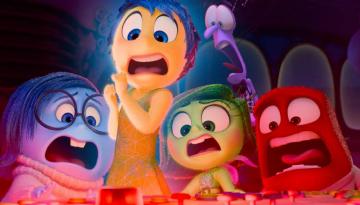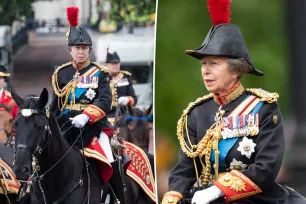It was the ’80s — Hindi cinema’s gaudiest era — when a dusky, lanky, curly-haired boy, dressed in the shiniest outfit possible, appeared on the big screen and danced to tracks like “I Am a Disco Dancer” and “Jimmy Jimmy“. Anyone else, dressed in those flamboyant costumes and performing those moves, would’ve looked comical, but it’s Mithun Chakraborty we are talking about! His ability to effortlessly synchronise complex steps with the upbeat tempo of disco music, mostly composed and sung by Bappi Lahiri, made him a campy pop culture phenomenon. Mithun’s movies and songs brought the “party” to the Indian masses and reached local streets, cinemas, and even shantytowns. But before Mithun, often criticised for his gutted teeth, skin colour and heavy Bengali accent, became known for his stylish swagger and as a male pin-up, he was a far cry from Bollywood’s quintessential hero. He was called ‘gareebon ka Amitabh,’ often discriminated against for appearing in B-grade films despite earning a National Award for his critically-acclaimed debut film, Mrigayaa (1976).
 Mithun Chakraborty in Disco Dancer. (Express Archive Photo)
Mithun Chakraborty in Disco Dancer. (Express Archive Photo)
Even in the ‘70s and ‘80s, in Bollywood, where stardom was often determined by pedigree and legacy, Mithun da, as he is fondly called, stood apart, emerging as the underdog hero of the masses. On one hand, the industry wasn’t very warm to him; on the other, arriving at the height of Amitabh Bachchan’s career was hardly ideal timing for him. He chose an alternative route instead of competing with A-listers. As the ‘King of B-grade cinema,’ throughout his acting career, he featured in many low-budget films like Gunda, becoming the icon for rickshaw wallahs, bus conductors, truck drivers, coolies, and factory workers. Mrinal Sen’s Mrigayaa had introduced Mithun to serious, art-house cinephiles, who were likely baffled by his subsequent film choices, but even in those movies, he shined. The actor featured in films like Surakshaa that set the stage for his 1980s stardom, Pyar Jhukta Nahin, Kasam Paida Karne Wale Ki, and Commando, among others.
 https://images.indianexpress.com/2020/08/1x1.png
https://images.indianexpress.com/2020/08/1x1.png
 Mithun Chakraborty is also known for his films Agneepath, Tahader Katha, Swami Vivekananda, Surakksha, Sahhas, Dance Dance, Wardat, Wanted, Boxer, Pyar Jhukta Nahin, Pyari Behna, Avinash, Prem Pratigyaa, Mujrim, Yugandhar, The Don, and Jallaad among others. (Photo: Express Archive)
Mithun Chakraborty is also known for his films Agneepath, Tahader Katha, Swami Vivekananda, Surakksha, Sahhas, Dance Dance, Wardat, Wanted, Boxer, Pyar Jhukta Nahin, Pyari Behna, Avinash, Prem Pratigyaa, Mujrim, Yugandhar, The Don, and Jallaad among others. (Photo: Express Archive)
“Looking at me, people’s expectations heightened, and they thought that even their son could become an actor despite living in a chawl or village. I became a common man’s hero. It was a very big thing for me to become a superstar of the common man,” Mithun told Radio Nasha. Born as Gouranga Chakraborty, when Kolkata’s Mithun came to Mumbai for the first time, he was confused and didn’t know where to go. He slept on the floor, ate off the streets, and enrolled in Matunga Gymkhana only because he could have a bath there. “It’s not been easy, but I have no complaints. Everyone calls me a legendary superstar; what else can I ask for,” he said in an interview to ETC.
While Mithun Chakraborty undoubtedly found a place in the hearts of the young, working-class men who shared his journey, he yearned for more. The ‘chalu crowd,’ he would call them, had embraced him wholeheartedly, but the talented actor sought to expand his fan base. “I am a trailblazer. I introduced disco dancing and karate at a time when nobody dared to touch them. And I did it well. The girls loved me. They called me the Indian James Bond, the Indian Bruce Lee. But after a point, I wanted to break away from that. I wanted to appeal to all kinds of people,” he was quoted as saying by Scroll.
 Mithun Chakraborty is fondly called Mithun Da by fans and friends. (Photo: Express Archive)
Mithun Chakraborty is fondly called Mithun Da by fans and friends. (Photo: Express Archive)
To move beyond the B-grade status, Mithun knew he needed to work with the cream of the crop in Bollywood — the A-list actresses of the time — who ruled the roost. But his professional journey from a B-grade actor to an A-grade actor was far from easy, pretty much like his personal life, which was full of hardships. The Kashmir Files actor told Man’s World India in 2022, “My journey has not been a bed of roses. My journey was all about challenges and the destination. I reached there after going through pain and struggle, but I fought every day to overcome it. I just want to tell people that if I can do it, so can you. Having said that, the film industry never remembers losers. You can only survive if you are good. I had to fight to reach where I am.”
 B Subhash with Mithun Chakraborty on the sets of Disco Dancer. (Photo: Express Archive)
B Subhash with Mithun Chakraborty on the sets of Disco Dancer. (Photo: Express Archive)
As Mithun Chakraborty struggled to get a breakthrough to act in A-grade films and yearned to be counted among Amitabh Bachchan, Vinod Khanna, Dharmendra, and Jeetendra, the industry seemed to be unsupportive as no A-list actress agreed to work with him. “I never want anybody to go through what I have gone through in life. Everyone has seen struggles and fought through difficult days, but I was always called out for my skin colour. I have been disrespected for a lot of years because of my skin colour,” the Gunda actor recalled during his appearance on Zee TV’s Sa Re Ga Ma Pa.
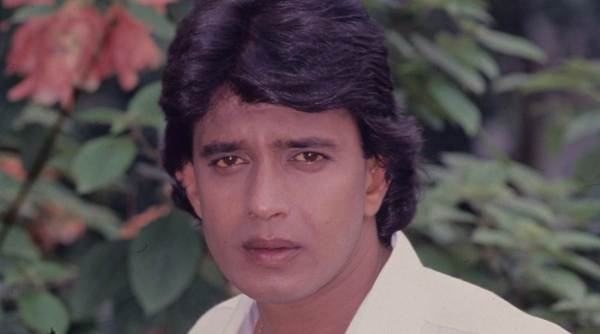 Despite winning a National Award for his debut film Mrigayaa, Mithun Chakraborty had complex about his darker skin tone. (Express Archive photo)
Despite winning a National Award for his debut film Mrigayaa, Mithun Chakraborty had complex about his darker skin tone. (Express Archive photo)
“Kitni ladaai ek insaan lad sakta hai? (How many battles can a person fight?) Koi bhi badi heroine mere saath kaam karne ko taiyaar nahin thi (no big actress was ready to work with me). They thought I was a ‘chota star’. ‘Yeh kabhi kya hero banega?’ (He can never become a hero),” said Mithun. Reflecting on his struggles as a B-grade actor, the Disco Dancer star lamented, “There were times when the actresses walked out of films even after the film was announced. Other actors warned those heroines, ‘Iske saath kaam karogi toh hamare saath kaam nahin kar sakti (If you work with Mithun, we won’t work with you in films).'”
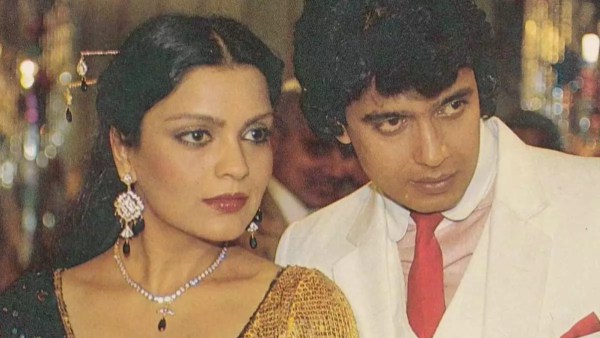 Mithun Chakraborty credits his stardom to co-star Zeenat Aman (Photo: YouTube)
Mithun Chakraborty credits his stardom to co-star Zeenat Aman (Photo: YouTube)
 After facing continuous rejections and setbacks, when director Brij Sadanah approached Zeenat Aman for a film titled Taqdeer, introducing Mithun Chakraborty as his hero, she instantly agreed to work with Mithun. “It was Zeenat ji who broke the jinx. Zeenat ji had the status of the number 1 heroine of that time, so following her footsteps, every other actress started saying yes to the films that I worked in. With Taqdeer’s release, I became an A-category actor,” he shared on Zee TV’s Sa Re Ga Ma Pa. The pair went on to star in several successful films together, including Yaadon Ki Kasam, Baat Ban Gayi, Ashanti, and Hum Se Hai Zamana. He was now being counted among the top A-listers and went on to feature in Swarg Se Sundar, Aandhi Toofan, Pyar Jhukta Nahin, Jaal, Dilwala, Phool Aur Angaar, Chandaal, Prem Pratigyaa, Dalal, Mard, Shera, and a slew of hit films.
After facing continuous rejections and setbacks, when director Brij Sadanah approached Zeenat Aman for a film titled Taqdeer, introducing Mithun Chakraborty as his hero, she instantly agreed to work with Mithun. “It was Zeenat ji who broke the jinx. Zeenat ji had the status of the number 1 heroine of that time, so following her footsteps, every other actress started saying yes to the films that I worked in. With Taqdeer’s release, I became an A-category actor,” he shared on Zee TV’s Sa Re Ga Ma Pa. The pair went on to star in several successful films together, including Yaadon Ki Kasam, Baat Ban Gayi, Ashanti, and Hum Se Hai Zamana. He was now being counted among the top A-listers and went on to feature in Swarg Se Sundar, Aandhi Toofan, Pyar Jhukta Nahin, Jaal, Dilwala, Phool Aur Angaar, Chandaal, Prem Pratigyaa, Dalal, Mard, Shera, and a slew of hit films.
 Mithun Chakraborty with director Mrinal Sen on the sets of Mrigayaa. (Photo: Instagram/Film History Pics)
Mithun Chakraborty with director Mrinal Sen on the sets of Mrigayaa. (Photo: Instagram/Film History Pics)
In 1998, following the success of Chandaal, his last solo hit, Mithun entered a challenging phase in his career. Over the next nine years, he starred in 33 films, all of which flopped at the box office. This series of disappointments included titles such as Hitler, Yamraaj, Ganga Ki Kasam, Billa No 786, Agniputra, Chalbaaz, Elaan, and Chingaari. The jinx was broken when he featured in Mani Ratnam’s Guru in a supporting role. But even during those years, he would overwork. Mimoh, Mithun’s son, said that his mother, actress Yogeeta Bali, witnessed the star’s downfall. “Whenever he had a flop, he would sink into depression. At that time, he would work four shifts a day, dedicating two hours to each set,” he told Siddharth Kannan.
In the ‘90s, Mithun Chakraborty moved to his own resort in Ooty, away from mainstream Bollywood, where B-grade film producers were given concessions to shoot at his resort, and in return, he would appear in these low-budget films. Mimoh, defending his father’s decision to act in B-grade films, added, “He did it for us, he did it for the hotel. Every unit from Bollywood movies, and also from the South, they’d stay at our hotel, so there was always an influx. He was doing it for the money. He never had any qualms. That was a phase like ‘I want to save for my children.’ Even today, he’s doing Dance Bangla Dance, Dance India Dance… Everything he does, he does it for us.”
 Mithun Chakraborty in a still from Gunda.
Mithun Chakraborty in a still from Gunda.
In a career spanning nearly five decades, Mithun has successfully juggled Hindi and Bengali cinema — where he is revered — and acted in over 300 films, often appearing in Tamil, Telugu, Kannada, Odia, and Bhojpuri films. He’s been bestowed with two Filmfare Awards and three National Awards for Mrigayaa (1976), Tahader Katha (1992), and Swami Vivekananda (1998). Despite playing a second fiddle to Amitabh in Agneepath, he stole the limelight in his role as a lungi-clad Krishnan Iyer MA. He enjoyed global stardom, more specifically in Russia, thanks to his Disco Dancer persona. “In Russia, there are statues of Jimmy, the hero of Disco Dancer. In Almaty, Kazakhstan, when Mithun went there in 2010–11, the President’s address to the nation was cancelled because a million-strong crowd was busy welcoming Mithun at the airport. In Tokyo, there is a shrine to the Disco Dancer and in Egypt, people often serenade and woo Indian tourists by singing Disco Dancer songs,” said Anubhav Pal, who wrote a book titled Disco Dancer: A Comedy In Five Acts.
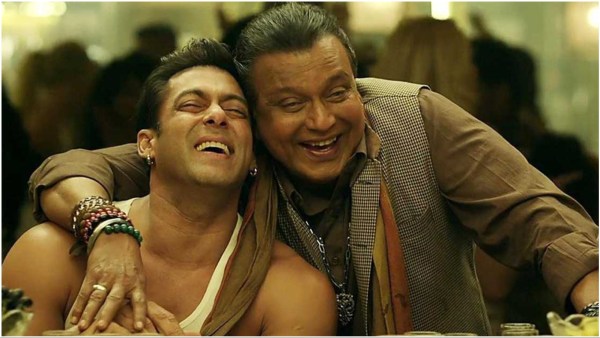 Salman Khan and Mithun Chakraborty in a still from Kick.
Salman Khan and Mithun Chakraborty in a still from Kick.
At 74, he is still unstoppable. The actor witnessed a successful phase following the release of Vivek Agnihotri’s The Kashmir Files, where his portrayal of Brahma Dutt earned widespread acclaim. Mithun may not be regularly seen on the screens, only doing select character roles, or popping up on your TV and phone screens selling home appliances and insurance policies, like Amitabh, but he continues to be relevant by constantly reinventing himself and changing with time. “I want to go with the time, not swim against the tide. If I think I’m still a Disco Dancer, I’ll be foolish,” he was quoted as saying by Open Magazine.
 Mithun Chakraborty in a still from The Kashmir Files. (Zee Studios)
Mithun Chakraborty in a still from The Kashmir Files. (Zee Studios)
One can only speculate whether Mithun da’s life story will inspire a filmmaker to make his biopic someday. Whether that happens or not, Mithun’s life story is undoubtedly worthy of being turned into a biopic. But the actor-politician, despite being vocal about his struggles, doesn’t want a biopic to be made on his life as he feels his tragic story will break the audience’s hearts and discourage them. “I don’t want my biopic to ever be made. My story will never inspire anyone, it will break them down (mentally) and discourage people from achieving their dreams. I don’t want that to happen! If I can do it, anyone else can do it,” he shared on Zee TV’s Sa Re Ga Ma Pa.
Click for more updates and latest Bollywood news along with Entertainment updates. Also get latest news and top headlines from India and around the world at The Indian Express.
Disclaimer: The copyright of this article belongs to the original author. Reposting this article is solely for the purpose of information dissemination and does not constitute any investment advice. If there is any infringement, please contact us immediately. We will make corrections or deletions as necessary. Thank you.





